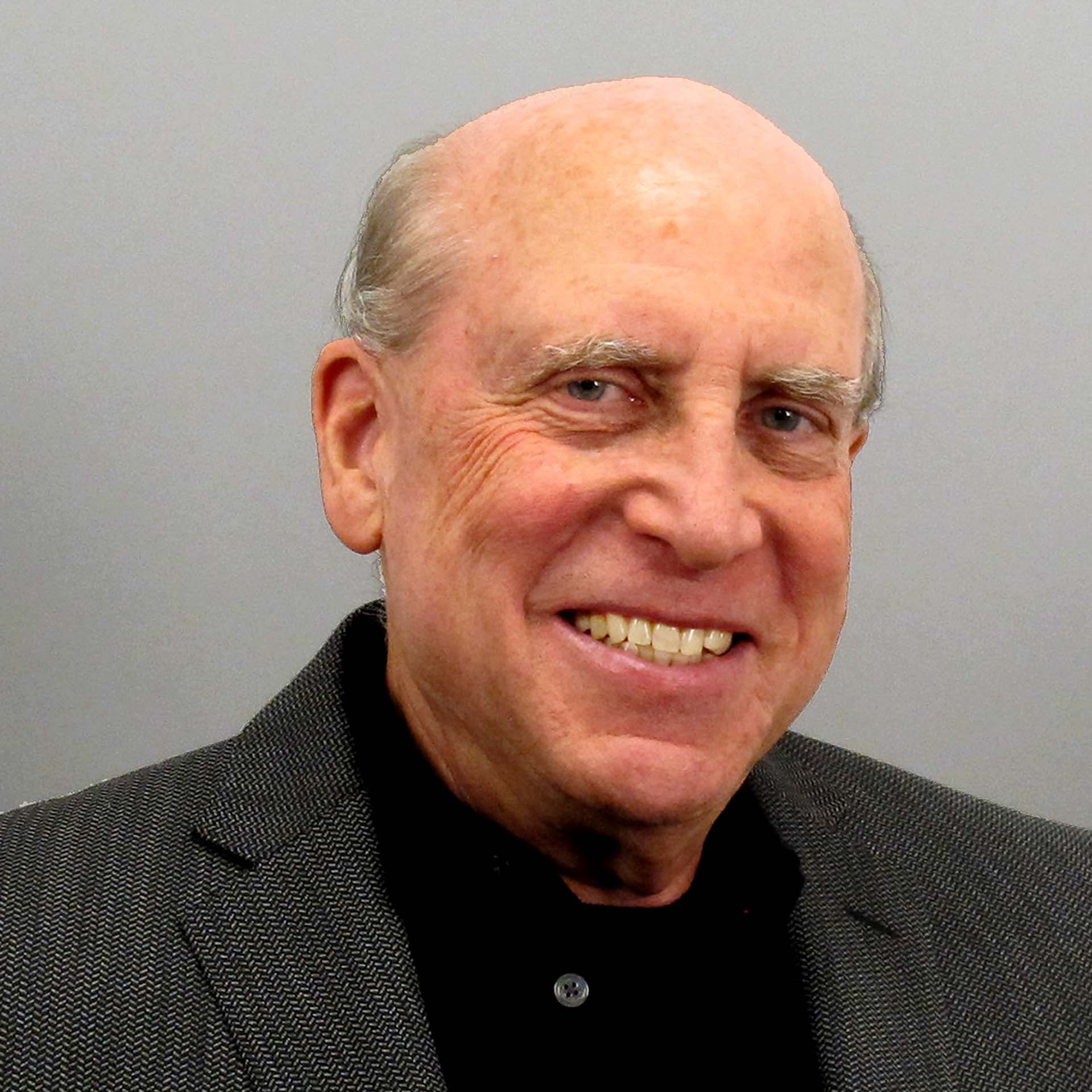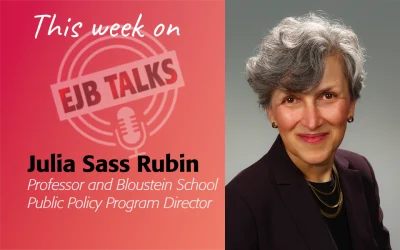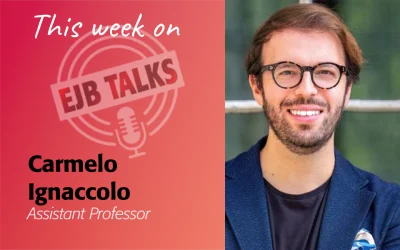On this episode of EJB Talks Stuart Shapiro welcomes Professor Emeritus Bob Lake, who helped shape our world-ranked urban planning program and led our doctoral program. Bob shares his vision of urban planning and talks to Stuart about his book on John Dewey, and how Dewey’s perspective of the Planning City, the continuous process of figuring out how best to live together, is his ideal of the practice of planning. The two then delve into the current political atmosphere in the U.S., the benefits and pitfalls surrounding the current state of community engagement, and its incredible importance but possible degradation to the democratic political process. Bob shares with Stuart his feeling of optimism about the future, based on his 46 years of educating astute and enthusiastic Bloustein students into democratically capable citizens who are committed to the long haul of figuring out how to make this world a better place.
Stuart Shapiro
Welcome to EJB Talks. I’m Stuart Shapiro, the Associate Dean of Faculty at the Bloustein School, and the purpose of this podcast is to highlight the work my colleagues and our alumni in the fields of policy, planning, and health are doing to make the world, the country, and New Jersey a better place.
In our continuing series of talking with recently retired and retiring faculty, today I’m honored to be speaking with Professor Emeritus Bob Lake, who led our doctoral program for years and also helped shape our world-ranked urban planning program. Bob, welcome to the podcast.
Bob Lake
Thank you, Stuart, I’m really happy to be here.
Stuart Shapiro
So we’ve been starting these with generally with sort of origin stories. How did you come to the Bloustein School?
Bob Lake
Yeah, so I kind of think that it was the other way around that the Bloustein School came to me. I came to Rutgers in 1974, I was still a doctoral student, aspiring PhD. I was looking for dissertation data. And my dissertation advisor gave me a list of people on the east coast to talk to and one of them was at Rutgers. And I made an appointment, I showed up, we had a conversation. I didn’t find any data, but they offered me a job.
Stuart Shapiro
Boy, things were different back then. ((laughing))
Bob Lake
((laughing)) Things were definitely different. It was a little more complicated than that. I came back for an interview, and so on. But that was, like I said, in 1974. And it wasn’t until several decades, actually, later that the Bloustein School was established. And in that time, I had started teaching courses in the planning department, it was a department at that time. And that was fun. And so there was a very close connection between where I was at the Center for Urban Policy Research, and the Department of Planning and Public Policy and policy development. So when the Planning and Policy departments got blended into the Bloustein School, there I was. And all of a sudden, I came to work one day, and they said, “Guess what, you’re now a faculty member in the Bloustein School”. And I said, I said, “Cool”. And the rest was history
In a brand spanking new building, which is now, of course, 25 years old. But yeah, so when I came to the Bloustein School, we’re talking about 2003 here. I had my degree in public policy, I had worked in Washington. And I really, if I was being honest with myself, had no idea what urban planning was. And now that I know you, I probably should have gone to you first for asking the question. What is urban planning? So if I came to you today, or if someone else came to you today, how would you answer that question?
Sure. So you know, I think the old line is, if you ask 10 urban planners to define urban planning, you’ll get 12 different answers.
Stuart Shapiro
And that’s true at the Bloustein School…
Bob Lake
And that’s certainly true at the Bloustein School, which is interdisciplinary, multidisciplinary, people from a variety of backgrounds and perspectives all come together in this collective project called planning. Which, you know, in the generic sense means, thinking about where you want to go and how you want to get there. And the definition or the job of the planner, has definitely evolved considerably over the, what, 100 years or so that that has been a recognized activity. You know, back in the day, planning was municipal engineering. It was building sanitary systems, and water supply systems, and responding to the devastation of the tenement life in the old industrial city. Where people were piled on top of each other, without sanitation, without water without air and light. And people looked around and said, you know, we can do better.
And the doing better was the origin of the idea of planning. And it kind of went on from there. My favorite quote on the question comes from one of my favorite philosophers, John Dewey, who talked about…
Stuart Shapiro
Who you just wrote a book about.
Bob Lake
Right. Who I just wrote a book about who occupies a lot of my waking hours. Who talked about moving from the idea of the Planned City to the idea of the Planning City. By which he meant, the Planned City is the idea that somebody has in their head, and then tries to implement on the ground. And the Planning City is a continuous process of looking around, evaluating what we do, what we’re doing, and how we’re living, and how we’re arranging our lives and thinking about how to improve it.
And instead of the Planned City being imposed on people, the Planning City is a city that engages people in a continuous process of figuring out how they want to live together. And in the simplest terms, or maybe the most complex terms that’s my definition of planning.
Stuart Shapiro
So you mentioned sort of engaging the community there. And that being a part of the Planning City. Let’s go off in that direction now. And let’s talk about community engagement. You know, in some senses, community engagement right now is at record levels. I mean, you look at school board meetings, my wife is a school board vice president here in our town, and you know, people turning out in droves for them. You talk about other kinds of public meetings, and you talk about even public spaces, and dialogues, you see a lot of it, but at the same time, it’s not really I think, sort of what planners think of is the kind of community engagement that moves us forward. And I’m wondering what your perspective is on that?
Bob Lake
Sure. So you know, there’s good news and bad news. The good news is that people are engaged. And the bad news is that people are engaged, right. And the real challenge is how to organize and channel and educate that engagement so that it can move the world in positive directions. And engagement is a real problem when the world is as it seems to be today, is polarized, is divided into us and them, is focused on differences and distinctions rather than similarities and common needs. And so, you know, throughout history, the idea of participation of political engagement of democracy has been a very double-edged kind of thing.
You know, the founding fathers, writing the Constitution, were very, as you well know being a policy analyst, were very skeptical about democracy, even as they built democracy into the very foundations of the Constitution. You know, we have an electoral college, because the founders didn’t think that the population was sufficiently capable of electing a president and we needed a special group of electors to make that decision. Now, up until it was changed through amendments, the Constitution did not allow for the popular election of the Senate, until that was changed. And in many, many other ways, while the original idea behind establishing this republic was about popular governance and democracy, there were all sorts of ways that were hedged around and, and limited to prevent what, you know, in the Federalist Papers, there’s lots of discussion about the dangers of factions.
Stuart Shapiro
Right. The role of 10.
Bob Lake
Exactly. People are divided up and then organized on the basis of a single idea that that divides them from everybody else. And the challenge, then, is to figure out not what is wrong with democracy, but how to make it work better. And, you know, Winston Churchill famously… or not, it might be apocryphal, defined democracy as the best system out there …. no as the worst, the WORST system out there except for all the others.
Stuart Shapiro
Right.
Bob Lake
And I think that’s probably where we are, right?
Stuart Shapiro
Yeah. So a lot of the past century has been very well-intended. Attempts to take down some of those guardrails against popular participation that the founders had erected, and some of them were initially put in for racist, sexist for all sorts of reasons, and removing them was a good thing. I guess the question is, and you’re talking about this a little bit is, how do we function with those guardrails gone? And is where we are now sort of what happens when we take the guard rails off?
Bob Lake
Yeah. So, you know, it seems to me we have two options when we’re thinking about this idea of democracy and all of the problems and challenges that presents. We can do, as I think Churchill was hinting at, we can just throw the idea out, right? And then of course, we’re stuck with the what then question, right? Democracy doesn’t work because people are disengaged, they’re apathetic, they’re biased, there caught up in these factions and cults and limited ways of thinking. Popular democracy just means that people are going to be biased in their judgments and exclusionary. And so there’s no hope here, just forget it. Right?
And then, of course, the question is, well then what do you do? And that leaves either dogmatic authoritarian rule by those who claim to have the answers, or complete anarchy, right and nothing much in between? So if we’re stuck with this idea, then the challenge is; okay, how do we work to make it better? And this, I think, leads us into an avenue a way of thinking that I think will be really frustrating for a lot of people, which is that we have to do the hard, long, dirty work of educating a democratic public to be better democrats. Small d democrats, right?
That if people aren’t democratically capable citizens, then it’s the job of society, and especially our job as educators to help people become better democratically capable citizens. And that’s something that happens over a lifetime, over several lifetimes, against the grain of all of the other influences that are moving in the opposite direction, and into which many, many people are invested in maintaining. But if, if we’re unhappy with the way democracy is working, then our challenge is to roll up our sleeves and dig in for the long haul, of figuring out how to make it better.
Stuart Shapiro
So I know you haven’t been in the classroom now in a year, but you’re not that far removed from it. You know, sometimes you read things that people are losing faith in democracy, and that they’re falling into that first camp that you’ve described, that it doesn’t work. I have to say, that’s not what I see in the classroom with my students. And we don’t talk about a lot I teach economics. So it doesn’t come up a ton. But you know, we have discussions about issues and such, and it’s clear, they’ve sort of bought into the system of making decisions and making it better. But I’m wondering what your perspective is on that in terms of where particularly young people but even people at large are in sort of their views of building democracy or shelving democracy?
Bob Lake
Yeah, you know, from my perspective, the delightful part about being a college teacher, college professor, and maybe especially in the field, like Planning and Public Policy, is that the students that come into this program, I think it’s fair to say across the board, do so because they believe that the world can be better and that they can play a role in moving the world in a better direction. And generation after generation after generation of students come into the programs committed to that idea. And what they what they’re looking for in a planning and policy school is the skills, the techniques, the knowledge, the perspectives, the lessons from past successes and failures, that will then equip them to contribute to that project of making the world a better place.
And you know, you can be sarcastic about it, you can be cynical about it. And you know, ” Oh those young people, they’re so idealistic and naive, and the world is tough and miserable, and they better figure that out.” Right. But, you know, then we might as well just throw up our hands and live in a cave. So, yeah, you know, I see that, that we sometimes kind of lose sight of that ideal, right? When we’re, you know, that what we’re really doing is teaching students how to use regression equations to project population projections or something, right? And we get caught up in the methods or the, you know, how wide does a sidewalk have to be to allow for efficient movement of people? Yeah, you know, all of that kind of factual and methodological issues are important. But they are all in service of encouraging that ethos of working together to make the world a better place. And that’s our job.
Stuart Shapiro
Yeah, it’s an interesting balance to try and strike because, you know, yes, and I completely agree that the idealism needs to be fostered and we meet need to make sure that they come out of school with the same idealism they came into it with. But like you said earlier, this is hard work, you know, sustaining it. And it’s never been clearer than in the past five years that sustaining democracy, and doing the work there is hard. You have to talk to people you don’t agree with, you have to convince them of ideas, that they may be, you know, maybe you’ve never heard before, maybe hostile to whatever. And so part of the challenge, I think, is, taking some of that cynicism, and telling the students, you know, okay, now go out there with your ideas, but be ready to push them in a way that’s productive and that move moves us forward to that democratic ideal?
Bob Lake
Well, you know, without a doubt, it’s hard work. If it was easy, we would have done it a long time ago.
Stuart Shapiro
Right.
Bob Lake
Right. Or whenever we thought we… whoever our ancestors… professional ancestors were, might have thought they had resolved the problem or solved a problem or accomplished something. The world changes we get confronted by new realizations, the emergence of new issues and new problems. Things that we thought were fine last year, which turns out not to be so fine, because we have new information, or a new perspective, or the world has changed and presented us with new issues. And so…
Stuart Shapiro
Or you have a global pandemic…
Bob Lake
Or you have a global pandemic. Or the equivalent and so, yeah, as I say, if it were easy, we would have been out of a job a long time ago.
Stuart Shapiro
Well, we’re both fortunate, I guess that it’s not easy, because I think we both have a lot of fun where we are. And we’re also lucky to be, as you noted in policy and planning fields, where we do get the kind of students we get, and I think at a public university in particular. As you look back at your time at Rutgers and at Bloustein, what do you look back at fondly now that you’ve had a year or so of distance and perspective there?
Bob Lake
Sure. You know, that’s an easy one. It’s the interaction with students. It’s the interaction with students who are incredibly smart, incredibly interested, and interesting, incredibly curious, and incredibly willing to grapple with the hard questions. You know, the experience of sitting in a seminar or classroom with a group of really smart really committed really intellectually open, and aware students and talking about issues, ideas, reading through somebody’s work, taking it apart, critiquing it, figuring out what we can learn. And then just seeing the engagement and hearing the engagement, and seeing those light bulbs of awareness and realization going off over all of those heads. It’s unparalleled.
And the privilege of being able to spend my time and occasionally even get paid to engage in that activity is just a gift. And I miss it in retirement and I look for it wherever I can find it. But clearly those kinds of interactions that gift of being able to think, together with other thinking people was priceless. And that’s what kept bringing me back to work every day for 46 years.
Stuart Shapiro
Couldn’t agree more. Bob, thanks for coming on today.
Bob Lake
Thank you, Stuart, and take care and good luck.
Stuart Shapiro
A big thank you to Bob and as well to our production team, Amy Cobb and Karyn Olsen. We’ll see you next week with another talk from another expert from the Bloustein School. Until then, stay safe




